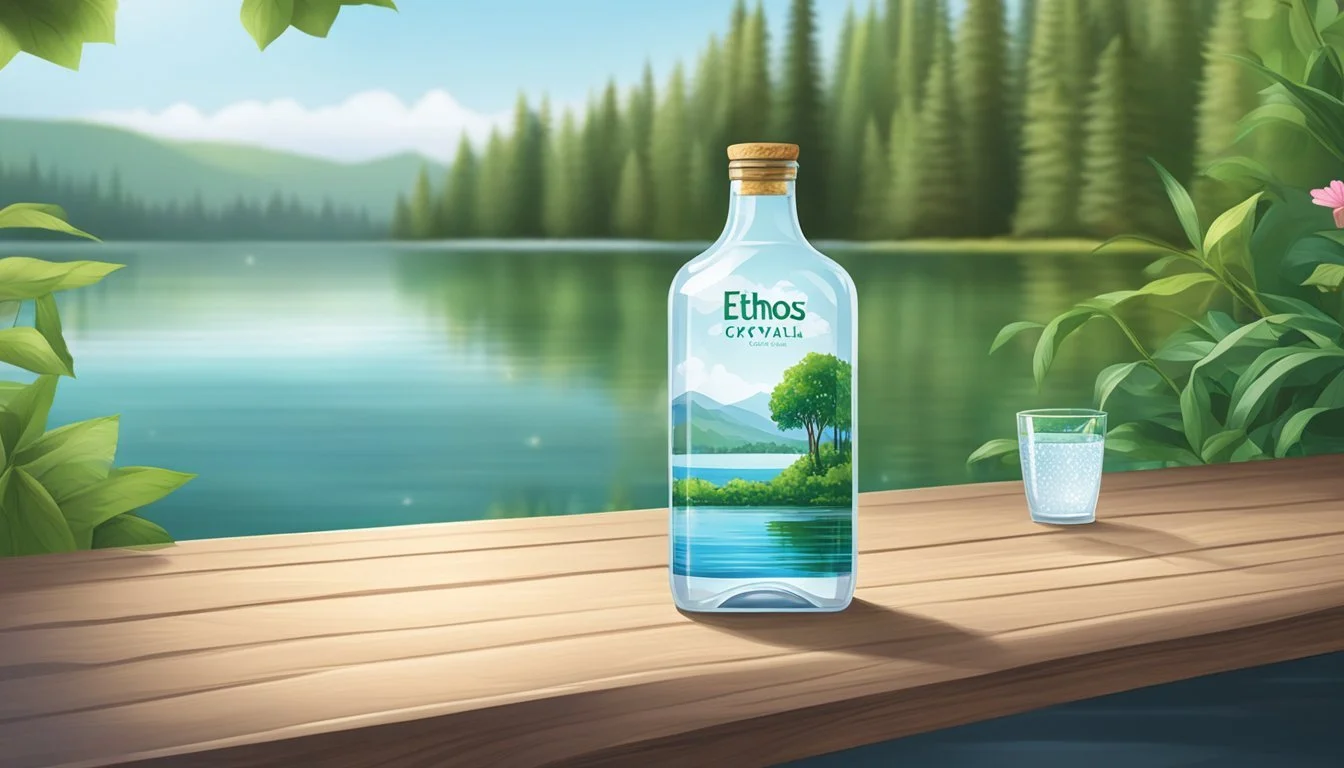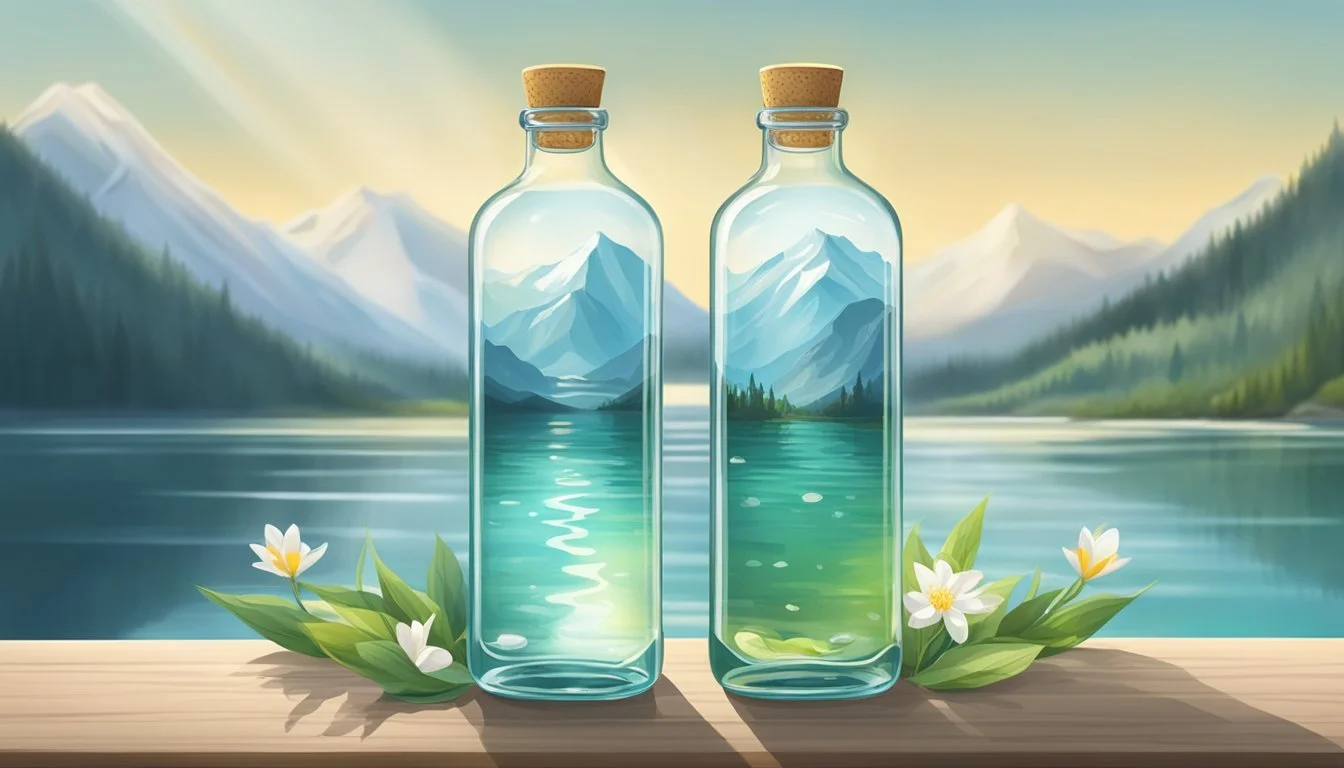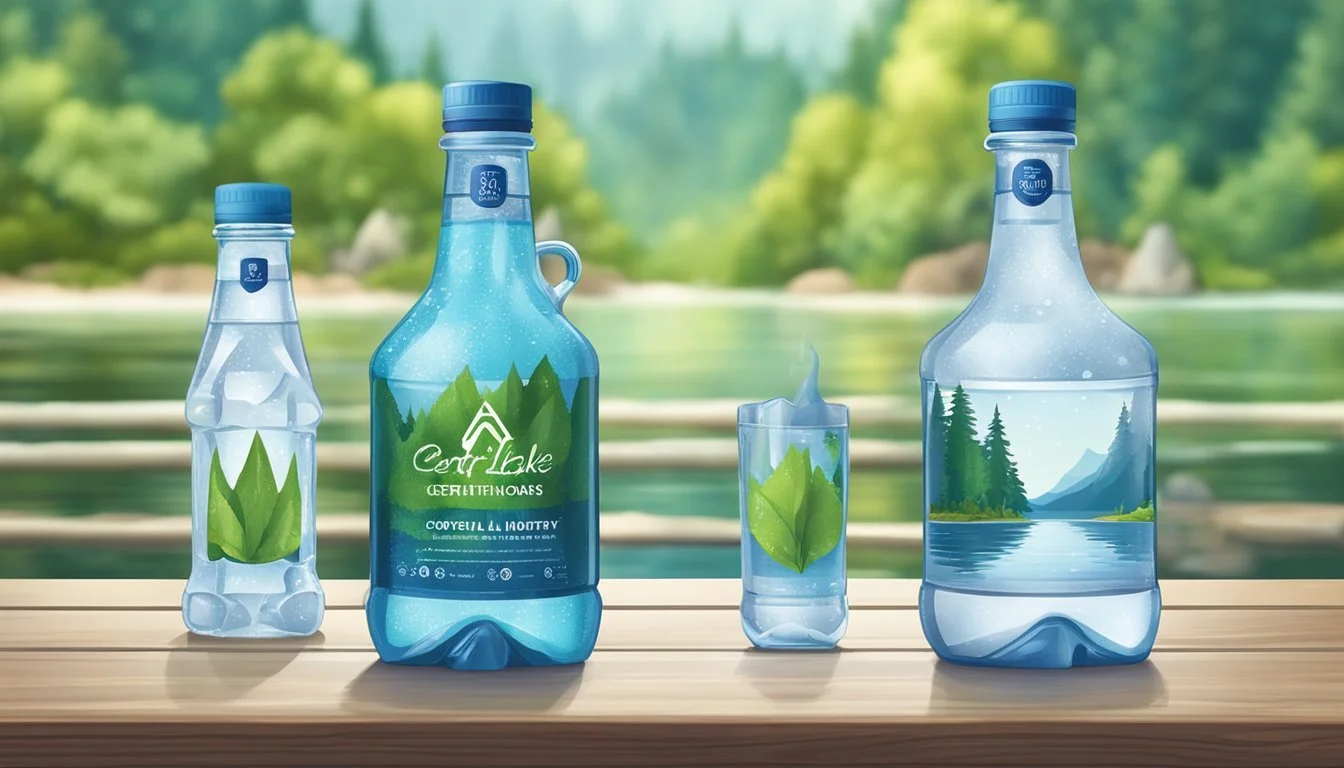Ethos vs. Crystal Lake
Which Bottled Water is Better for You?
When it comes to choosing between Ethos and Crystal Lake bottled waters, the decision hinges on several factors from taste to sustainability. Ethos stands out not only for its crisp, clean taste but also for its commitment to social causes, including contributions to clean water initiatives. Crystal Lake, on the other hand, emphasizes purity and reliability, providing a consistent drinking experience that many consumers prefer.
For those prioritizing social impact alongside quality, Ethos is the clear winner with its added value of charitable endeavors. Crystal Lake competes strongly with a focus on delivering a pure and refreshing hydration experience without any frills.
This comparison dives into the taste profiles, sourcing practices, and overall brand philosophies, providing a comprehensive look to help consumers make an informed choice.
Understanding Bottled Water
Bottled water is available in various types, each offering distinct characteristics. These include spring water, mineral water, sparkling water, purified water, and alkaline water.
Spring water is sourced from natural springs and is usually rich in natural minerals. Brands like Arrowhead Mountain Spring Water, though abundant, may sometimes be considered uninspiring.
Mineral water contains minerals such as calcium and magnesium, which can contribute to health benefits. These minerals are naturally present and not added during bottling.
Sparkling water is infused with carbon dioxide to create bubbles. This type of water can be derived from natural sources or be artificially carbonated.
Purified water has undergone processing to remove impurities and contaminants. It often comes from tap water that has been treated through methods such as distillation, deionization, or reverse osmosis.
Alkaline water has a higher pH level compared to regular drinking water. It is often marketed for its potential health benefits, though scientific evidence on these claims varies.
A comparison of tap water and bottled water often reveals significant differences in taste, purity, and mineral content. Tap water quality can vary widely based on location and local water treatment practices.
Ethos and other brands emphasize packaging sustainability, such as the use of recyclable materials and charitable initiatives. This reflects broader trends in the bottled water industry towards environmental responsibility.
Understanding these differences helps consumers make informed choices based on their preferences and health considerations.
Taste and Purity Analysis
The evaluation of Ethos and Crystal Lake bottled waters covers several critical aspects, including taste attributes, purity levels, and processing techniques. Each area provides valuable insights for choosing the superior option.
Profile of a Water Sommelier
A water sommelier, an expert in the taste profiles of water, is crucial in assessing bottled waters. They analyze aroma, flavor, mouthfeel, and finish. Ethos often garners praise for its clean taste with a refreshing finish, aligning with its mission to provide quality water. Crystal Lake, known for its consistent taste, appeals to consumers preferring a crisp and natural flavor. These professionals use their refined palates to detect subtle nuances that are imperceptible to the average consumer.
Taste Testing Methodologies
Taste testing bottled water involves a rigorous methodology. This typically includes blind taste tests to eliminate bias, with evaluations focused on flavor. Participants assess multiple dimensions, such as initial taste, bitterness, and minerality in the aftertaste. Ethos, sourced from carefully managed supplies, is often cited for its smooth profile. Reverse osmosis and other filtration stages play a critical role in shaping the ultimate taste. Crystal Lake's water also goes through extensive filtration, ensuring a pure and pleasant flavor.
Purity and Contaminants
Purity is a significant factor, measured by the absence of harmful contaminants. Ethos prides itself on being a socially conscious brand, often surpassing industry standards for water purity. Its commitment includes comprehensive testing to ensure no presence of heavy metals and minimal nitrate levels. Crystal Lake maintains stringent controls to guarantee its water remains free from impurities, appealing to those sensitive to both taste and health impacts. Both brands emphasize the non-detectable levels of chlorine and fluoride, ensuring a pure drinking experience.
Bottled Water Processing Techniques
Processing techniques such as reverse osmosis, ozonation, and ultraviolet disinfection are vital to water quality. Ethos utilizes these methods, ensuring removal of contaminants while preserving essential electrolytes for optimal hydration. This process enhances the overall taste and purity. Crystal Lake employs similar methods, focusing on refining the water without stripping beneficial minerals, resulting in a balanced mineral aftertaste. The technological rigor behind these methods ensures both brands deliver high-quality bottled water to consumers.
By examining these aspects through the lens of expertise and methodical testing, Ethos and Crystal Lake demonstrate their commitment to providing top-tier bottled water.
The Brands in the Spotlight
Examining Ethos Water and Crystal Geyser reveals their distinct qualities and appeal. With Ethos emphasizing its charitable contributions and Crystal Geyser promoting natural purity, clear distinctions can be drawn between the two.
Ethos Water: Philanthropy through Hydration
Ethos Water, owned by Starbucks, not only provides bottled water but also supports global water initiatives. The company donates five cents from each bottle sold to help children access clean water, making its purchase an act of philanthropy.
Consumers are drawn to Ethos for both its taste and its social responsibility. The brand focuses on hydration while contributing to a larger cause. This combination of quality and charity elevates Ethos beyond just a bottled water choice.
Crystal Geyser: Alpine Purity
Crystal Geyser prides itself on delivering pure and crisp water, sourced from natural Alpine springs. The brand emphasizes its dedication to natural purity, ensuring that its water remains free from added chemicals and is bottled at the source.
The appeal of Crystal Geyser lies in its commitment to natural sourcing and the inherent purity of its product. This makes it a favored choice among consumers who prioritize natural and untouched water sources.
Comparison with Other Popular Brands
When compared with brands like Dasani, Aquafina, and Fiji, Ethos' charitable mission stands out. While other brands also offer high-quality water, the social impact component of Ethos can be a deciding factor for many consumers.
In contrast, Crystal Geyser competes on the basis of natural purity, akin to brands like Evian and Icelandic Glacial. Its emphasis on untouched water sources appeals to those who are highly conscious of the source and processing of their bottled water.
Other brands such as Essentia, Smartwater, and San Pellegrino offer different attributes like enhanced electrolytes or sparkling options, but Ethos and Crystal Geyser carve out niches through philanthropy and natural simplicity, respectively.
Health and Hydration Benefits
Ethos and Crystal Lake both offer unique benefits in terms of health and hydration.
Hydration and Its Impact on Health
Ethos water is known for its electrolyte content which helps in maintaining hydration levels. Electrolytes such as sodium and potassium found in Ethos water assist in regulating muscle and nerve function. This makes it an ideal choice for active individuals.
Crystal Lake, on the other hand, boasts a rich mineral composition. Minerals like calcium and magnesium are essential for bone health and metabolic activities. The natural spring source of Crystal Lake adds to its smooth taste and balanced pH, enhancing overall hydration.
Both these bottled waters offer distinct advantages. Ethos is aimed at those needing rapid rehydration, while Crystal Lake provides additional health benefits through its mineral-rich content.
Source and Origin Stories
Ethos and Crystal Lake bottled waters draw from different sources, each with unique characteristics that influence the taste and quality of the water. Here, we explore the origins of these waters and how their sources impact their overall profile.
Natural Springs and Their Legendary Origins
Ethos sources its water from natural springs located in the United States. Emphasizing purity, the company often highlights the pristine environments from which the water originates. These springs are known for their clean and refreshing output, which is a crucial selling point for the brand.
Crystal Lake water, in contrast, is drawn from mountain springs, such as those found in the Alps. The water undergoes natural filtration through layers of rock, adding minerals that contribute to its flavor. The legendary origin of these mountain springs provides a romantic allure, appealing to consumers seeking a more exotic hydration option.
How the Source Influences Quality
The source of Ethos water, being primarily U.S.-based, ensures rigorous quality standards and consistent taste. The spring water is naturally filtered, collecting essential minerals that enhance its quality. The sustainability practices of the source also play a role, ensuring the water's purity remains intact.
Crystal Lake water benefits from its alpine origins, often associated with superior mineral content. The mountainous terrain acts as a natural filter, imbuing the water with a distinct, crisp taste. This high mineral content not only affects flavor but also adds to the perceptions of health benefits, making it a preferred choice for many.
Ethos and Crystal Lake make great use of their unique sources, each with distinct advantages influencing water quality and consumer preference.
Market Trends and Consumer Behavior
Ethos and Crystal Lake both play significant roles in the bottled water market, which is experiencing various trends. Understanding the consumption statistics and marketing strategies of these brands reveals how they capture the attention of consumers.
Bottled Water Consumption Statistics
Bottled water remains the most popular beverage in America, with volume sales of 15.9 billion gallons in 2022. This indicates a modest growth from the previous year. The bottled water market has seen a slowed growth rate, yet it continues to dominate due to factors like health concerns and convenience.
Consumers prefer bottled water for its ease of access and perceived purity, especially in areas where tap water quality is questionable. The U.S. market alone was valued at USD 44.6 billion in 2023, with an expected growth rate of 5.8% annually. This upward trend reflects the increasing demand for convenient and sanitary drinking options.
Marketing Strategies of Major Brands
Ethos and Crystal Lake adopt distinct marketing strategies to appeal to their target markets. Ethos emphasizes its charitable contributions, appealing to socially conscious consumers by supporting clean water initiatives globally. This adds an emotional value beyond just hydration.
Crystal Lake, on the other hand, focuses on purity and health benefits, often highlighting rigorous quality controls and the natural sources of its water. Both brands use recyclable materials in their packaging to align with environmental concerns, a strategy that attracts eco-conscious consumers.
Major brands also leverage strategic placement in grocery stores and convenience stores to maximize visibility and sales. Promotions, attractive packaging, and strategic partnerships further enhance their market presence and consumer appeal.
Packaging and Environmental Concerns
Ethos Water and Crystal Lake have distinct approaches to packaging which impact their environmental footprint. Exploring how each brand utilizes different materials and innovations provides insights into their sustainability practices.
Plastic vs. Glass: A Sustainable Dilemma
Ethos primarily uses plastic bottles for their water. These bottles are often made from BPA-free materials, ensuring they are safe for consumers. Crystal Lake, on the other hand, offers their water in both plastic and glass bottles.
Glass bottles are often considered more sustainable since they are fully recyclable and can be reused multiple times without degrading. Plastic bottles, while convenient and less likely to break, pose significant environmental challenges if not properly recycled.
Blutriton is an innovative material sometimes used in plastic bottles to provide durability and avoid BPA-related health concerns. However, it’s crucial that these materials are disposed of or recycled appropriately to minimize their environmental impact.
Innovation in Eco-friendly Bottles
Both brands are making strides toward eco-friendly packaging. Ethos emphasizes the use of recyclable plastic bottles, adding a charitable component by contributing to clean water initiatives.
Crystal Lake focuses on reducing its carbon footprint through recyclable glass and plastic options. They are exploring new materials and methods to lessen the environmental load, such as integrating biodegradable components in their packaging.
Innovations in bottle design, such as lightweight structures and advanced recycling methods, are also pivotal. These steps help reduce waste and promote a more sustainable approach to bottled water packaging.
Comparative Analysis
Ethos and Crystal Lake are evaluated on taste, quality, and texture to determine which bottled water stands out. Attention is given to scores from professional tasters and rankers to help readers make informed choices.
Taste and Quality Scoring
Ethos water positions itself with a strong emphasis on charitable contributions and sustainability. This could impact consumer perception positively. On the taste scale, Ethos maintains a mild mineral note, which has been appreciated by some tasters for its clean finish.
Crystal Lake, contrasting with Ethos, is often described as notably crisp and refreshing. Professional water sommeliers and ranking reports have highlighted its pure quality. Taste scores for Crystal Lake tend to be higher, thanks to its more pronounced clarity and favorable mineral balance.
Best Water Rankings: From Worst to Best
Ethos and Crystal Lake fall into a competitive space among bottled water brands. When ranked from worst to best, Ethos often finds itself in the middle tier. While it excels in environmental and social aspects, its taste and packaging are seen as industry-average.
Crystal Lake, on the other hand, frequently ranks in the upper bracket. This is attributed to its excellent taste profile, minimal additives, and high source quality. Review compilations and consumer ratings have commended Crystal Lake for its consistent delivery of a clean, refreshing product.
Texture and Mouthfeel
Texture and mouthfeel are critical for gauging bottled water quality. Ethos water offers a smooth experience with negligible aftertaste, making it a solid choice for those who prefer a subtle texture. Its well-balanced mineral content contributes to its soft mouthfeel, appealing to a broad audience.
Crystal Lake's texture is often described as more invigorating owing to its crisp and clear sensations. The structured texture provides a refreshing burst, enhancing its appeal for those who favor a more defined water profile. Reports consistently showcase Crystal Lake's superior mouthfeel as a key differentiator.
Certifications and Industry Standards
Ensuring bottled water meets industry certifications and standards is crucial for consumer trust. Both Ethos and Crystal Lake adhere to stringent guidelines and provide quality reports.
International Bottled Water Association Guidelines
The International Bottled Water Association (IBWA) sets stringent guidelines for bottled water safety and quality. Ethos and Crystal Lake both comply with IBWA standards, ensuring their water is free from contaminants.
These guidelines include regular testing for bacteria, chemicals, and other impurities. Compliance with these standards often requires state-of-the-art purification processes, adherence to specific packaging criteria, and frequent sanitary inspections.
Both companies highlight their commitment to these guidelines on their websites, providing consumers with assurance of the safety and quality of their product. Adhering to IBWA standards is a testament to their dedication to delivering high-quality water.
Quality Reports and Consumer Trust
Transparency is essential in building consumer trust. Ethos and Crystal Lake publish detailed quality reports that disclose the origin and purification process of their water. These reports are often available as downloadable PDFs from their official websites.
The quality reports typically include information on the water source, the purification methods used, and results from regular testing for contaminants. Providing these reports helps consumers make informed choices about the bottled water they purchase.
Consumers value this transparency and often look for brands that openly share this information. Both Ethos and Crystal Lake understand the importance of maintaining consumer trust through transparent practices.
More About Ethos
Ethos vs Mountain Valley Spring Water: Which Bottled Water is Better?
Ethos vs Richard's Rainwater: Which Bottled Water is Better?
Ethos vs Whole Foods Italian Still Mineral water: Which Bottled Water is Better?
More About Crystal Lake
Aqua Carpatica vs Crystal Lake: Which Bottled Water is Better?
Cascade Mountain vs Crystal Lake: Which Bottled Water is Better?
Core Hydration vs Crystal Lake: Which Bottled Water is Better?
Crystal Geyser vs Crystal Lake: Which Bottled Water is Better?
Crystal Lake vs Essence pH10: Which Bottled Water is Better?
Crystal Lake vs Proud Source: Which Bottled Water is Better?
Hawaii Volcanic vs Crystal Lake: Which Bottled Water is Better?
Hawaiian Springs vs Crystal Lake: Which Bottled Water is Better?
Ice Mountain vs Crystal Lake: Which Bottled Water is Better?
Icelandic Glacial vs Crystal Lake: Which Bottled Water is Better?
Kirkland Signature vs Crystal Lake: Which Bottled Water is Better?
Liquid Death vs Crystal Lake: Which Bottled Water is Better?
Mountain Valley Spring Water vs Crystal Lake: Which Bottled Water is Better?
Nestle Pure Life vs Crystal Lake: Which Bottled Water is Better?
Poland Spring vs Crystal Lake: Which Bottled Water is Better?
Purely Sedona vs Crystal Lake: Which Bottled Water is Better?
Richard's Rainwater vs Crystal Lake: Which Bottled Water is Better?
San Pellegrino vs Crystal Lake: Which Bottled Water is Better?
Simple Truth vs Crystal Lake: Which Bottled Water is Better?
Solan de Cabras vs Crystal Lake: Which Bottled Water is Better?
Talking Rain AQA vs Crystal Lake: Which Bottled Water is Better?
Whole Foods 365 vs Crystal Lake: Which Bottled Water is Better?
Whole Foods Italian Still Mineral water vs Crystal Lake: Which Bottled Water is Better?






